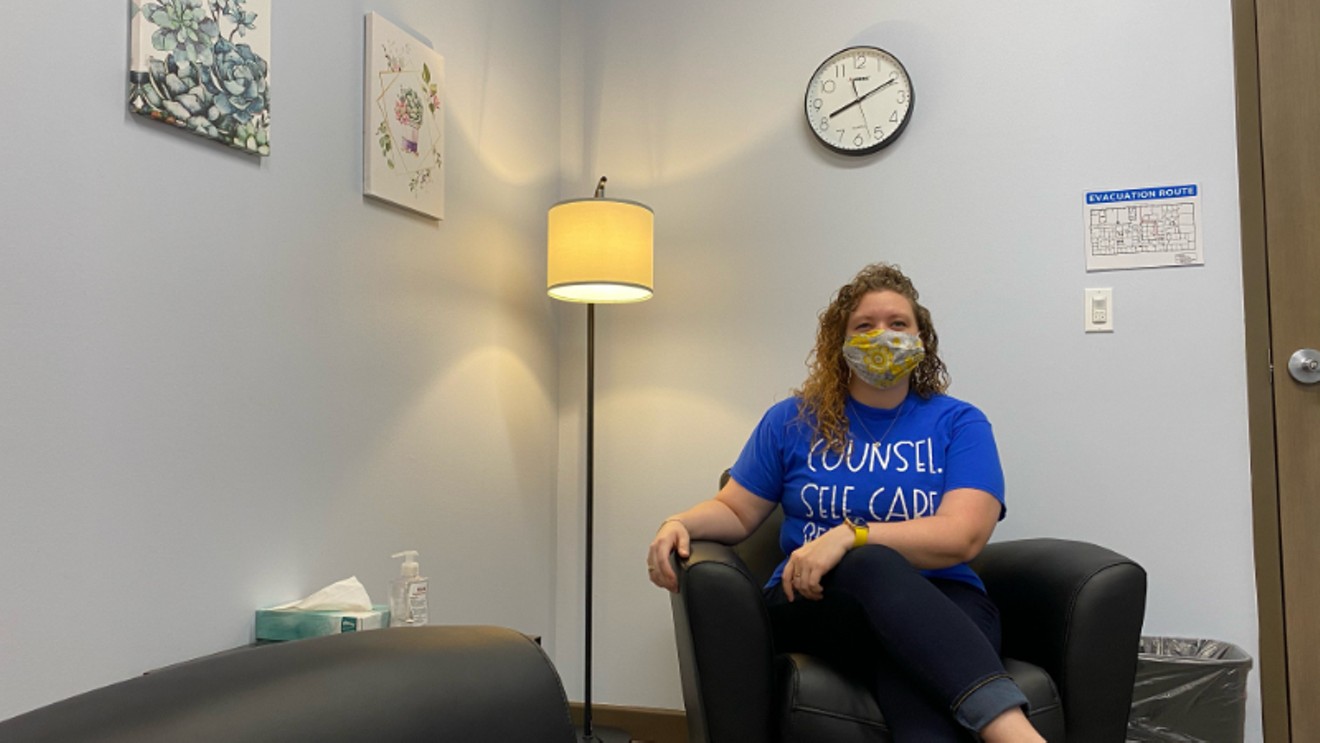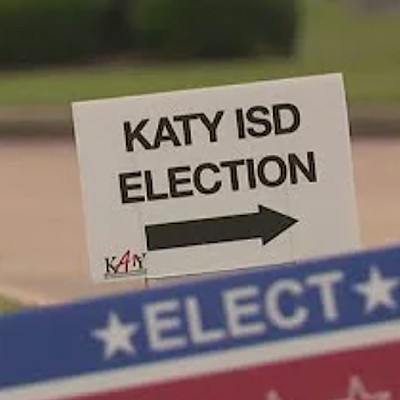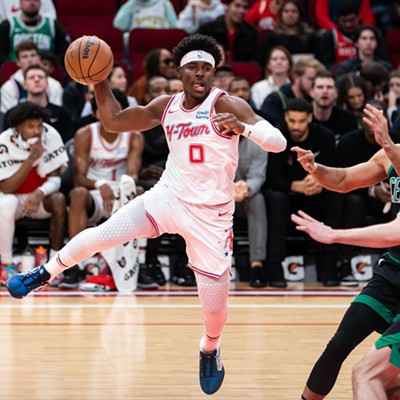Ashley Burks touches the doorknob to her office, wondering who might have put their hands on it while she was away. She looks through the room at the community health center where she works, gaming out all of the potential permutations of where her client may choose to sit down and how she'd safely position herself in response.
It's August 2020 and she's ready to get back to counseling but is hyper-aware that she hasn't seen a client in more than a year since finishing up at the University of Houston. It's her first appointment since COVID-19 hit.
She runs through her non-negotiables again: Masks? Absolutely, and they'll stay on the whole time. Handshakes? Not a chance.
When her client arrives, he lets Burks open the door to her office for him before he plops down in the middle of the couch by the wall. He's a man in his 20s or 30s with long-distance relationship troubles who works in healthcare. She's relieved after he mentions his line of work, hoping it means he's taking coronavirus precautions seriously like she is.
The masks make hearing each other trickier than in her past therapy sessions, and since Burks has a hearing impairment, she finds herself having to ask her client to repeat himself more than she’d like. All the while, there are two little voices dueling in her head: the trained professional counselor, and the pandemic safety stickler.
“I just remember thinking ‘Wow, this seems pretty far apart to me for a counseling experience,’ but then the other half of me was like ‘Wow, this is not six feet!’” she says.
Burks is one of many recent Houston-area counseling grads trying to get their careers off the ground in a world they never saw coming, at a time when more people than ever are struggling with mental health issues and the epidemic of isolation and loneliness wrought by COVID-19.
Not Enough Counselors to Go Around
At the same time that the pandemic has caused and exacerbated so many mental health issues and put counseling in even higher demand, little has changed in Texas where there simply aren't enough counselors in many parts of the state.When asked to describe what exactly counselors do for a living, Texas Counseling Association Executive Director Jan Friese explains that they "work across the lifespan with small children all the way up to very senior adults to help to provide therapeutic interventions to help those individuals resolve challenges or crises that they are experiencing to help them function effectively and productively, and to continue to move forward to achieve their life’s goals.”
According to Friese, licensed professional counselors “are the largest group of mental healthcare professionals in the state, so they are really essential to keeping Texans emotionally robust.” That means when most everyday Texans refer to “therapy” or “going to a therapist,” they’re often talking about seeing a licensed professional counselor.
That’s the type of care Burks hopes to provide to her clients at Coastal Bend Wellness Foundation, a health center that serves mostly LGBTQ clients and focuses on HIV and AIDS prevention and treatment. Burks is a licensed professional counselor associate which means her work is still being overseen by a supervisor. On top of her counseling, Burks is also working toward her Ph.D. in counselor education at Texas A&M Corpus Christi, with the goal of getting enough on-the-ground experience and theoretical know-how to help train the next generation of counselors in Texas.
Professional counselors in Texas have to first get their master’s of education in counseling (or an MA in a related field like psychology with the right counseling-focused classes), which earns them the title of Licensed Professional Counselor-Associate. To get fully licensed, associates then have to accrue at least 1,500 hours of counseling experience and 3,000 total work hours under the guidance of a Licensed Professional Counselor-Supervisor, a veteran counselor paid by their associates to be a mentor and sounding board for early-career counselors.
As of February 11 2021, there were 25,039 licensed professional counselors in Texas, 4,548 of whom were associates and 5,334 who were supervisors according to a representative from the Texas State Board of Examiners of Professional Counselors.
Those might sound like large numbers, but Friese insists it’s nowhere near enough to meet the mental health needs of Texans, especially given all the stresses of life in the time of COVID. “Even before the pandemic hit, more than half of the counties in Texas were designated as mental health workforce shortage areas,” she says.
Michael DeVoll, a longtime Houston-based counseling supervisor who runs his own private counseling practice, says it’s tougher than ever to get started as a counselor given COVID-19.
“I think people aren’t acutely aware of how disconnected everyone feels, and the depth of the impact that that has,” DeVoll says. He mentioned how he gives out his personal cell phone number to counselors he works with, and how he’s received way more calls during the pandemic than in years past.
One of his associates moved to Houston during the pandemic for a counseling job and is struggling with how to feel connected to others in a socially-distanced time where it’s harder than ever to make new friends. Another is a woman who struggled with juggling her employer’s demand that she dial-in to the online group therapy sessions she leads, even though she had young kids at home who needed supervision during their virtual school hours.
Counseling is tough work, DeVoll says, "and there is burnout from it, and so I think it's just one of those jobs that takes a special personality type to be able to do it."
"One of the questions that I get a lot is 'How do you stand to sit and listen to people's problems all day?' And so I think a lot of people don't think that it feels like a 'fun' job," he says, which he thinks may be a reason there aren't more counselors in Texas.
Getting a master's degree isn't cheap either, and recouping those costs can be tough given that the parts of the state with mental healthcare workforce shortages tend to be more rural or suburban. In those places, lots of folks depend on Medicaid, Medicare or health insurance to pay for counseling, which means therapists make less money than they would in cities where more of their clients can pay a counselor's full-priced, non-subsidized rates.
"That makes it more difficult to make a living in those smaller areas," DeVoll says.
While he is paid to be a supervisor, DeVoll considers his supervising work a way to give back to the local counseling community that supported him in his early days as a therapist and gives him an opportunity to keep his teaching chops fresh. He also knows how valuable having a friendly mentor to dial up at a moment’s notice is these days, in part because he still leans on a group of experienced local counselors he’s been coming to for guidance for years now.
The support of fellow counselors is something Zamaria Venzant — a 2017 graduate from Texas Southern University’s counseling master’s program — counts as a blessing, and she credits her therapist colleagues with helping her through a year like no other.
Counselor Support For Counselors
“We have a little group of therapists," Venzant says, who turn to each other to "kind of talk out different things when it comes to therapy and our practices,” she continues; The group includes her two former counseling supervisors, fellow counselors she went to TSU with and a group of counseling colleagues she’s met through social media over the years.That support network helped Venzant through the trials of starting her own private practice, Embracing Minds Counseling, in Austin this past summer, just a few months before giving birth to her first child.
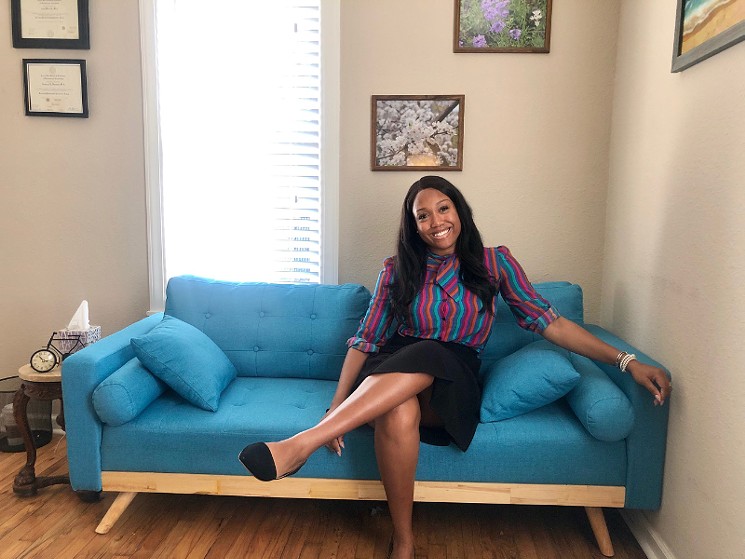
TSU Grad and Licensed Professional Counselor Zamaria Venzant started her own business amid pregnancy and the pandemic.
Photo by Isaiah Venzant
Most of Venzant’s clients come through referrals from the online Therapy For Black Girls network. They’re mostly college-aged women or recent grads dealing with life transitions who want to figure out how to finally see the payoff of all their hard work in school over the years. Venzant says the pandemic made all those issues pop up even more frequently.
“What I’m hearing is ‘I spent all this time to accomplish things, and then I did it, and I was supposed to reap the benefits and now I can’t,’” she says.
It’s another feeling Venzant relates to, as she often finds herself daydreaming about when it’ll be safe to finally take a trip to Mexico with her husband and her son, and wishes more than anything that she could safely take her son to her all-time favorite water park, Schliterbahn in New Braunfels.
Venzant has also spent much of the past year helping her clients deal with the mental anguish from this summer’s avalanche of tragic killings of Black Americans like George Floyd and Breonna Taylor at the hands of police officers across the country.
“I get a lot of Black clients who are [also] just working on dealing with the micro-traumas they’re experiencing, seeing all these things on the news,” she says. “How do they feel like they have a place in the world when some things are telling them that they don’t?” Venzant says.
While she was able to make the transition to virtual video appointments fairly quickly in the pandemic’s early days (and still sees 99 percent of her clients virtually, she says), the newly digitized counseling world comes with its fair share of frustrations.
One of Venzant’s not-so-favorite pandemic developments is how some of her clients will try and dial-in to their video chat appointments through their cell phones while driving or riding in a car somewhere. One client called-in through her dashboard-mounted phone while literally driving around town; Another asked if she could go through with their appointment even though the client was video-chatting while riding around with her boyfriend.
At times like that, “I have to reschedule, because it’s just unsafe,” Venzant says.
And Try Working Without Tech Support
Recent UH grad and associate counselor Emily Hum would have felt lucky to have those kind of tech-induced problems while she was counseling kids from Montgomery, Walker and Liberty counties with behavioral issues at Tri-County Behavioral Healthcare last spring and summer. Her former employer didn’t even have the software in place to do video calls.That meant every one of Hum’s appointments after Gov. Greg Abbot issued his statewide stay-home order in March 2020 had to be done over the phone, which would be difficult with an adult on the other end of the line but was triply hard for Hum considering how many of her clients were four and five-year-olds.
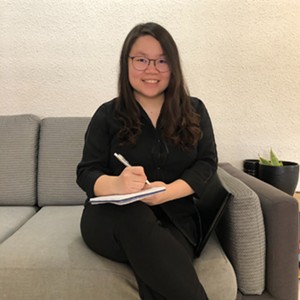
Emily Hum says despite the stress, she loved the work she did with troubled kids at Tri-County Behavioral Healthcare.
Photo by Quikshia Teoh
“But it became really hard,” she says, trying on-the-fly to teach these parents struggling with their own stress how to deal with their kids’ meltdowns without the comforting support of in-person counseling sessions or having a trained teacher in the room. “We usually work with kids to not fight in school, but how do we control parents if kids have a meltdown at home — what do we do?”
As a temporary United States resident from Malaysia at the time, Hum had to quit her counseling job at Tri-County Behavioral Healthcare in June because her visa was set to expire in mid-July. She hopes to return to America one of these days, but she'll need to first find a counseling job that can sponsor a new visa or enroll in another graduate school program.
While she doesn’t miss the frustration of trying to corral troubled kids and their parents into hour-long counseling calls as she virtually tutors American students from her parents’ house in Perak, Malaysia, she says she would have kept at it if she could have stayed in the states a bit longer.
Even though the situation was far from ideal, it was still a paid counseling gig, which is hard to come by in Texas even given the state’s documented shortage of mental health workers.
“I would probably have stayed if my visa didn’t expire,” Hum says, “but it was definitely very draining at that point. There were multiple coworkers, and we’d just talk and be like ‘This is so much, but it’s hard to find a job like that.’”
“So it’s not like we were just gonna quit,” she continues.
A Common Experience
Hum’s fellow UH Cougar and associate counselor Blaine Hummel never considered quitting counseling altogether after COVID-19 hit the Houston area last March, but he was spooked enough by the coronavirus that he did take a break for nearly five months.“I prefer to see clients in person, but wasn’t really willing to do that with the pandemic,” he says. Plus, he was worried about being able to make strong connections through video chat with the mostly middle school and high school-aged boys seeking his guidance.
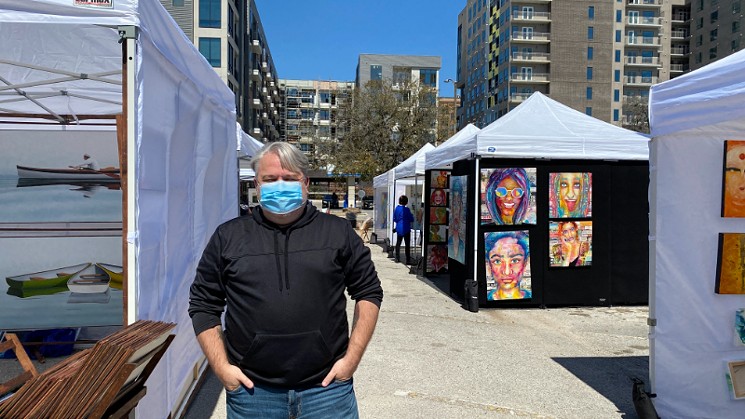
Woodlands-based therapist Blaine Hummel wants folks to know counselors like him are only a call away.
Photo by Schaefer Edwards
Hummel started counseling after spending nearly two decades working as a civil defense attorney, and was inspired to switch careers after going through a divorce a few years back. Although he’s done a little lawyering on the side for extra cash since graduating from UH’s master’s program, he hopes to become a full-time counselor once he’s fully licensed.
Hummel went back to counseling at Grace & Guidance PLLC in The Woodlands this past July, first through virtual video appointments. While very nervous about getting or spreading COVID-19, he eventually felt comfortable enough to see a few specific clients in-person whose parents were eager to get their kids some socialization. Hummel feels a lot better about being in the same room with clients now that he’s fully-vaccinated against COVID-19, and says his appointments are roughly half virtual and half face-to-face at this point. He still always wears a mask in the office, and requires his clients to do the same.
These days, most of his clients are coming in to work through the feelings of loneliness and isolation that come from being stuck in remote school for months on end and the anxiety that follows.
Having school-aged kids at home himself, Hummel has seen firsthand what months of little-to-no social interaction and the rigors of virtual schooling can do to a child’s mental well being. He’s no stranger to being anxious either.
“I’ve struggled all my life with anxiety. I sort of have a very high-baseline of being anxious. I struggle with my own issues of perfectionism, and quite frankly when I was younger, out of law school and what have you, I was partying way too much and way too often," Hummel says. "I certainly have issues with overeating and food, so I have gone through 12-step programs on those issues."
As much as Hummel believes in the value of being open and honest about his own mental health struggles and his acknowledgement of how difficult it’s been to get by during this pandemic himself, he doesn’t want that level of honesty to potentially scare off Texans in need from seeking out the help of a professional counselor if they’re in crisis.
“I would like to offer reassurance," Hummel says. "We’re going through the same issues with respect to the pandemic, so we understand them and can relate to our clients," he acknowledges, but makes sure to stress that counselors like him "are professionals, and know how to manage our own situation. And I would encourage anybody who’s having difficulties to seek help,” he says.
“That’s the big message, I think,” Hummel continues. “I don’t want people to be concerned that their counselors are suffering or anything like that." The last thing he wants is for anyone "[to] feel like they would be a burden on a counselor.”
Burks believes that acknowledging the pains of pandemic life has helped her form stronger bonds with her clients, which she thinks will only help them get further along the road to managing their mental health needs.
“If we do mention the pandemic, or kind of give a nod to the pandemic in session, it’s almost like a bonding experience,” she says.
“Because that was something that, no matter who you are, we all experienced in some way.”

